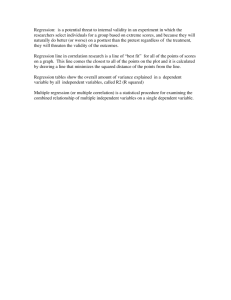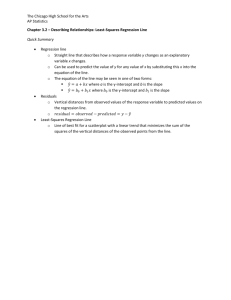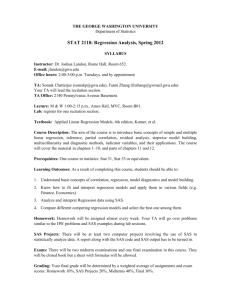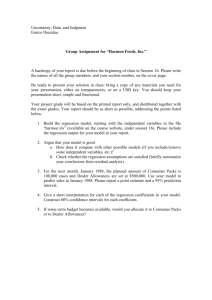APM 630. REGRESSION ANALYSIS
advertisement
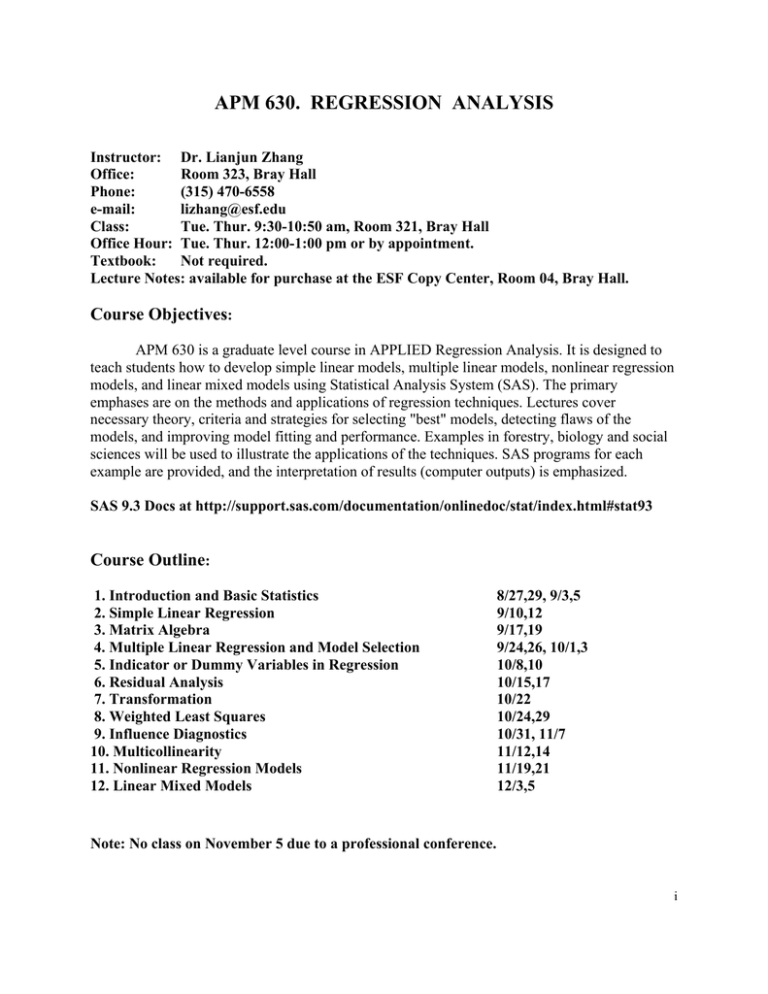
APM 630. REGRESSION ANALYSIS Instructor: Dr. Lianjun Zhang Office: Room 323, Bray Hall Phone: (315) 470-6558 e-mail: lizhang@esf.edu Class: Tue. Thur. 9:30-10:50 am, Room 321, Bray Hall Office Hour: Tue. Thur. 12:00-1:00 pm or by appointment. Textbook: Not required. Lecture Notes: available for purchase at the ESF Copy Center, Room 04, Bray Hall. Course Objectives: APM 630 is a graduate level course in APPLIED Regression Analysis. It is designed to teach students how to develop simple linear models, multiple linear models, nonlinear regression models, and linear mixed models using Statistical Analysis System (SAS). The primary emphases are on the methods and applications of regression techniques. Lectures cover necessary theory, criteria and strategies for selecting "best" models, detecting flaws of the models, and improving model fitting and performance. Examples in forestry, biology and social sciences will be used to illustrate the applications of the techniques. SAS programs for each example are provided, and the interpretation of results (computer outputs) is emphasized. SAS 9.3 Docs at http://support.sas.com/documentation/onlinedoc/stat/index.html#stat93 Course Outline: 1. Introduction and Basic Statistics 2. Simple Linear Regression 3. Matrix Algebra 4. Multiple Linear Regression and Model Selection 5. Indicator or Dummy Variables in Regression 6. Residual Analysis 7. Transformation 8. Weighted Least Squares 9. Influence Diagnostics 10. Multicollinearity 11. Nonlinear Regression Models 12. Linear Mixed Models 8/27,29, 9/3,5 9/10,12 9/17,19 9/24,26, 10/1,3 10/8,10 10/15,17 10/22 10/24,29 10/31, 11/7 11/12,14 11/19,21 12/3,5 Note: No class on November 5 due to a professional conference. i Reference: Drapper, N.R. and H. Smith. 1998. Applied Regression Analysis. 3rd Ed. John Wiley and Sons. Montgomery, D.C., and E.A. Peck. 2006. Introduction to Linear Regression Analysis. 4th Ed. John Wiley & Sons. Myers, R.H. 1990. Classical and Modern Regression with Applications. 2nd Ed. PWS-Kent. Neter, J., M.H. Kuter, C.J. Nachtsheim, and W. Wasserman. 1996. Applied Linear Regression Models. 3rd Ed. IRWIN. Rawlings, J.O., S.G. Pantula, and D.A. Dickey. 1998. Applied Regression Analysis: A Research Tool. 2nd Ed. Springer. Evaluation: Your progress will be evaluated by the following weights: Quizzes Homework/Project Assignments 10% 90% Note: 1. There will be 5 random and unannounced quizzes during the semester (simple and open notes). 2. Homework/project assignments will usually require statistical analysis, model development, and interpretation of the results. You may work with other students on statistical computing and discussion of potential solutions. You will be expected to submit your own report for the analysis results. Copying the report from each other is NOT acceptable. 3. Late project report will be penalized 10 points for each week passing the due date. 4. Most of your homework/project will require a project report which should include (1) introduction, purpose, and description of the study and data sets, (2) step-by-step analysis methods, (3) models, analysis results and discussion, including necessary tables and graphics, and (4) summary. Attach your SAS programs as the appendix. Stacking selected SAS output without sufficient explanation would not be considered a report. An incomplete report that does not follow the reporting requirements will have a 10 points reduction. Grading System: Your final grade will be determined as follows: 95 - 99 90 - 94 85 - 89 80 - 84 75 - 79 < 75 = F =A = A= B+ =B = B- Good Luck! ii

